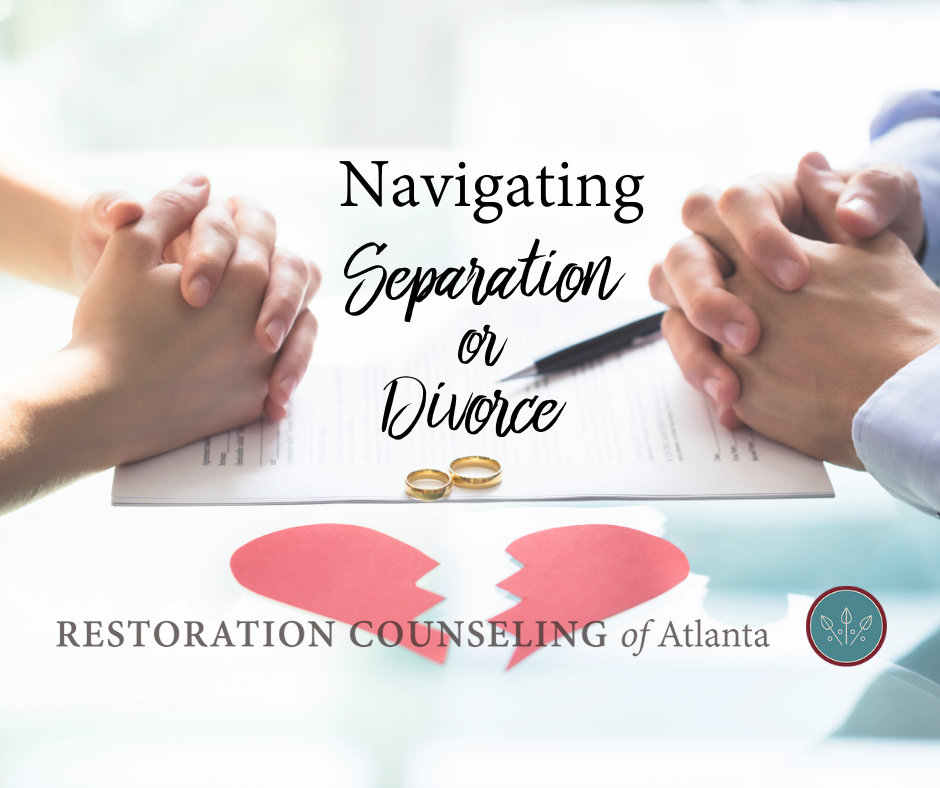Navigating Separation or Divorce
In my previous article on marriages, I presented the idea that diagnosing the health of a marriage is critical for effective treatment. This is done in the same way that a wise doctor would not always see all coughs as a common cold. Proper diagnosis determines proper treatment. Diagnosis is also important if you are considering separation or divorce.
Nationally known Christian therapist, author, and speaker Leslie Vernick (www.leslievernick.com) is a voice in the Christian community that speaks to this issue. She identifies three categories of distress in marriages: difficult, disappointing, and destructive.
My previous article looked at these three types of marriages. Often there are basic therapeutic changes that can be made in a difficult or disappointing marriage. With a destructive marriage, often the initial focus needs to be more on safety and boundaries.
How to Identify a Destructive Marriage
Leslie Vernick offers this list of characteristics to help identify a destructive marriage:
- Chronic deceit
- Imbalance of power and control
- Chronic disrespect/ abuse (verbal or physical)
- Consistent lack of mutuality, reciprocity, and freedom
- Chronic indifference
- Lack of personal responsibility for wrongs. Blameshifting
- Attitude of entitlement
How to Identify a Need for Safety
If factors from the above list and the following list are present, the need for safety increases:
- Divorce or Separation
- Alcohol or Drug use
- Narcissistic tendencies
- Guns or weapons around
- Emotionally unstable (mental health problems, head injuries that lead to violent behavior, etc.)
- Rebellious (won’t listen to authority)
- Other violent behavior (towards animals, road rage, etc.)
- Unpredictable (Dr. Jekyll/ Mr. Hyde)
- Suicide or Homicide threats
Could you be in a danger zone?
If you realize that your marriage may be in a dangerous zone it doesn’t mean that divorce is your next call. As Leslie states, Christ cares about our safety yet as believers. It is honoring to Him to either stay well or leave well. Staying well or leaving well requires that we do our part to be as emotionally and spiritually healthy as possible. This will most likely require professional help from a therapist or person well-versed in how to navigate our triggers and growth areas.
Might autism be a factor?
A disclaimer to the above list is an issue that can often get overlooked. High functioning autism (HFA) used to be called Asperberger’s. Characteristics may include the inability to see another person’s perspective. This can look like an inability to validate another person or accept another’s criticism of them, to have rigid or concrete thinking, and a desire to isolate from others. It often leads a spouse to FEEL like they are in a destructive relationship. Currently, there is more focus on diagnosis with younger males. As a result, older males who may have these traits may have been overlooked during their youth when awareness of this was not prominent. Generally, someone with autistic traits is not intentionally failing to provide mutuality, take ownership, or be indifferent. It is important to obtain help from a qualified professional to help sort out some of the other possible causes.
The Importance of Boundaries
One of the important ways to stay safe in a relationship is to have an accurate understanding of boundaries and how to use them appropriately. Dr. Henry Cloud, author of Boundaries and other Boundaries type books offer helpful advice. He states that boundaries are about owning what is within my power and control, like my feelings, thoughts, and actions.
Often we try to use boundaries to control another person’s thoughts, feelings, or actions. Using boundaries inappropriately is under-handed control. This only reinforces an already negative dynamic. Therapy can help individuals identify their feelings and healthy corresponding boundaries. Many individuals lacked healthy models of boundaries in their family of origin. Later, they find themselves in marriages where healthy boundaries are lacking. Finding support from someone well-versed in healthy boundaries is important.
Learn to manage your feelings.
Often we falsely believe that someone else makes us feel or act a way that we don’t like. How we choose to think about a situation influences our feelings and actions. Therefore, exploring ways that we can manage our hurtful feelings or responses is an important place to start. Often, hurtful issues from our past may unknowingly show up in this dynamic. Working with a therapist to untangle those underlying issues can help defuse a toxic dynamic between couples.
Separation can often be a healthy next step while trying to get help for these areas. Storming to a divorce attorney when we are flooded with negative emotions is usually not a healthy next step. Wise decisions are usually best made when our emotions are balanced with logic. We need to set good boundaries as we’ve worked through aspects that may be fueling our pain from the destructive partner. If someone finds themselves or their children at risk for physical or emotional abuse, it is advised to have a plan in place. Have important documents in order and consider sheltering in approved sites for women in this situation.
Consider Discernment Counseling.
Perhaps you are not necessarily in a destructive relationship. You may have been blind-sighted by a spouse who said they don’t want to be in the marriage anymore. Some therapists offer a structured type of assessment process called Discernment Counseling. This is designed to help couples if one partner is not sure they want to stay married. They may doubt that couples counseling will help. The counseling supports each partner in this mixed agenda stance. At the end of each session (up to a maximum of five), each person discerns whether or not they agree to continue with the sessions. This can help ambivalent couples gain clarity and avoid a premature divorce or a divorce that leaves one partner baffled as to what happened. Asking an ambivalent spouse to consider this type of therapy can provide needed space to process emotions and gain clarity.
Assess the option of separation.
Separation is best viewed as a means to provide safety while focusing on healing. It is not a way to avoid/escape the problems, punish a spouse, or delay a divorce. For the spouse suggesting separation, examining your motives and own flaws beforehand is important. Often we place unrealistic expectations on our partner for our happiness. When our spouse fails to provide that, we assume the relationship is destructive. If the marriage feels destructive or destructive aspects truly are present, separation while pursuing individual help can help. It can provide the needed space for individual healing to occur. This may decrease previous destructive tendencies. Separating without seeking professional help is like parking your ailing car and hoping it will somehow repair itself over time. We all know that for our car to be fixed, we have to take it to a trained mechanic for a while.
Understand separation agreements.
Though not legal in every state, separation agreements can provide practical details and desired needs between both parties for a period. This form of boundaries that can be very effective in influencing a change in either party. Divorce mediation centers can often help in this process. They walk each party through the realities of the financial adjustments and logistical parent agreements. This happens before committing legally and financially to a lawyer and to the legal process of divorce. Once started, the divorce process often keeps couples moving toward divorce even if they have a change of heart once the realities start setting in. Making decisions based on someone else’s situation or story (like a friend or family member) is not the best way to decide on an action of this magnitude. A professional is always the best source of information. Traditional routes of divorce that begin with an attorney often pit you against your partner. This creates more distress, conflict, and unnecessary costs than seeking help from a mediator first.
Consider the emotional effects.
Couples often report that divorce is much more painful than they anticipated. Caution and care should be taken when pursuing this path. Therapy can help individuals process the myriad of emotions and complex situations. It is important to understand the emotional needs of any shared children. It is also critical to consider how to co-parent effectively to reduce collateral damage. Understanding the dynamics that might have contributed to a break up is important to accept. This is helpful to prepare and be ready to move into a possible future relationship. Therapy can help with all of these aspects.
Navigate the process utilizing available help.
If you’re navigating separation or divorce, it is important to accept your feelings and practice self-care and self-compassion. This will help you stay balanced in the difficulties of the process. Avoid people who want to give advice. Seek companions who can listen and validate your feelings. Focus on nurturing activities and lifestyles. All of these are aspects of boundaries. They are areas of your life that only you can control. Create proactive stances to help you to move through the stages of grief that are often common. This can prevent you from “dumping” on your children. They are the least capable of helping and need support themselves.
Navigating separation or divorce is not an easy path. Unproductive detours, dangerous pits or valleys, and routes with no return are common. Seek professional help from someone who can be a trusted guide and help you find the safest passage possible. You and those you love will be glad that you did. If I can be of help in this area, please reach out.
Roswell Location
Debbie Turner received her Master’s in Marriage and Family Therapy from Richmont Graduate University; an academically sound, Christ-centered program. She is passionate about helping individuals and couples learn new ways of connecting with Christ and others to facilitate healing, transformation, and restoration.
Debbie has also completed training from Postpartum Support International. She is qualified to assess and treat women struggling with issues like depression, anxiety, anger, intrusive thoughts, or repetitive behaviors that can occur during pregnancy or after delivery.


 by
by